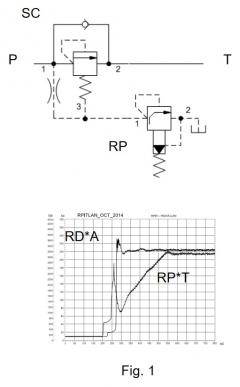A direct-acting sequence valve SC*A can be used as a main stage relief. By applying pressure onto port 3, the setting and/or relief characteristics of the SC*A can be controlled separately from the main stage. An external orifice is used to limit the pilot flow to the relief valve RP*T
- Direct-acting sequence: SC*A,
- Relief valves as pilot: RP*T, RD*A
Benefits of this circuit arrangement:
- The direct-acting sequence valve SC*A as a main stage controls high flow rates well and has a good response time. Since the pilot valve (RP*T) has a high capacity, the main stage SC*A can open very fast. Piloting a SC*A with a RP*T effectively produces a 3 stage valve
- Fig.1 shows the step response of a standard direct-acting relief valve RD*A and an anti-shock relief RP*T.
- The SC*A should be set to its minimum setting without pilot pressure. Approximately 300 psi is a good minimum setting for a fast reseat.



